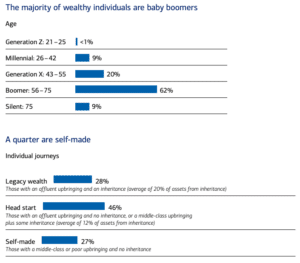A few months ago Bank of America released its 2022 Private Bank Study of Wealthy Americans. The study asked 1,052 households with more than $3 million in investable assets how they invest their money and how they feel about different asset classes.

There always seems to be a fascination with how the wealthy accumulate their riches, how they invest, and if they do something or know something different than the average person. This study attempts to answer some of those questions.
Some key findings were:
• Younger wealthy households (those aged 21-42) were more skeptical of traditional investments like stocks and bonds than older wealthy households (those 43 and up).
• Older households allocated, on average, 55% of their portfolios to stocks and index funds while younger households only held 25%. Additionally, older households held only 2% of their portfolio in cryptocurrency while younger households allocated around 15%.
Looking forward to what investments offer the greatest potential for growth in the future, younger households believe that cryptocurrency, real estate, and private equity have the highest potential while older households believe it’s U.S. stocks, real estate, and emerging market stocks.
Initially, it can seem like the study suggests that the wealthy are changing how they invest. While they used to invest in stocks, bonds, and real estate, they now prefer investments like crypto, private companies, and other alternatives.
However, I think this occurrence has more to do with how the study is designed than anything else. Since wealth is positively correlated with age, by sampling only those with high amounts of wealth, all of the younger households surveyed likely had extraordinary financial circumstances.

In other words, wealthy households are rare but younger wealthy households are even more exceptional in how they got wealthy. For example, having $3 million in net worth (excluding home equity) would put you in the top 7% among 55 to 59 year olds but in the top 0.1% among 25 to 29 year olds.
Young wealthy households are unique. Some started with more initial wealth (inheritances, parental support, etc.) than most and others had atypical financial success (company went public/acquired, bought crypto early, etc.). As a result, it makes sense that these younger wealthy people would feel differently about how to get rich than most people who get rich.
As Michael Kitces stated about this survey:
“This isn’t generationally unique. People who make money from private companies (e.g., founders, executives, tech w/ stock options, etc.) tend to keep seeking private/alt investments.”
People tend to stick with what got them wealthy in the first place. Which may not be replicable for somebody else.
Also, the shift away from traditional asset classes like stocks and bonds and towards alternative investments like private equity and hedge funds is typically positively correlated with the amount of wealth someone has.
High net worth investors (greater than $1M in assets) allocate around 25% of their portfolios to alternatives while ultra-high net worth investors (greater than $30 million in assets) allocate around 50%.
Why? The main reason is alternative investments are generally limited to your bankroll. While anyone can buy shares of an S&P 500 index fund, the same isn’t true when it comes to investing in private equity or a hedge fund. The exclusivity of an investment can be more appealing to wealthy investors than the promise of outperformance.

I would also wager a guess that as wealth grows people simply tend to get bored and look for more places to put their money than the stock market. Not all investing is about money—it’s often about status too.
In any case, just because wealthy investors allocate more money to alternatives does not mean that’s what everyone should do.
When talking about how wealthy people invest their money, there seems to be a misconception that their investment decisions are what made them rich in the first place. For some wealthy individuals, this is true. Warren Buffet got rich based on how he invested his money. But for most wealthy individuals this isn’t the case.
They became wealthy first by being born into it, or selling a private company, or joining a successful startup as an early employee. Or they got rich as successful business owners or doctors or lawyers (or anything else) and have since allocated their wealth to a myriad of different investment options.
And although data shows that wealthier people tend to own more alternative “sexier” investments, this doesn’t mean that they’ve abandoned traditional asset classes. Try not to forget that the wealthiest 10% of Americans own nearly 90% of all U.S. stocks.

So what can we learn from this survey of how the wealthy invest? The data suggests that there are many ways to get rich and many ways to preserve and grow your wealth. The important part is finding what works best for you and not blindly following the investment decisions of the wealthy just because they’re wealthy.
Wealth might be a sign of good decisions, but can those decisions be repeated? And do good decisions in one field translate to wisdom in other areas of life? Maybe, maybe not—that’s the best we can say.
“One of the most persistent fallacies is the reflexive association of wealth with wisdom.” – Ed Borgato
Thanks for reading!

